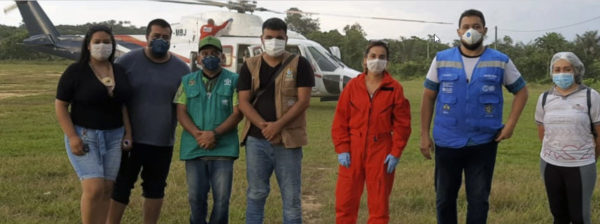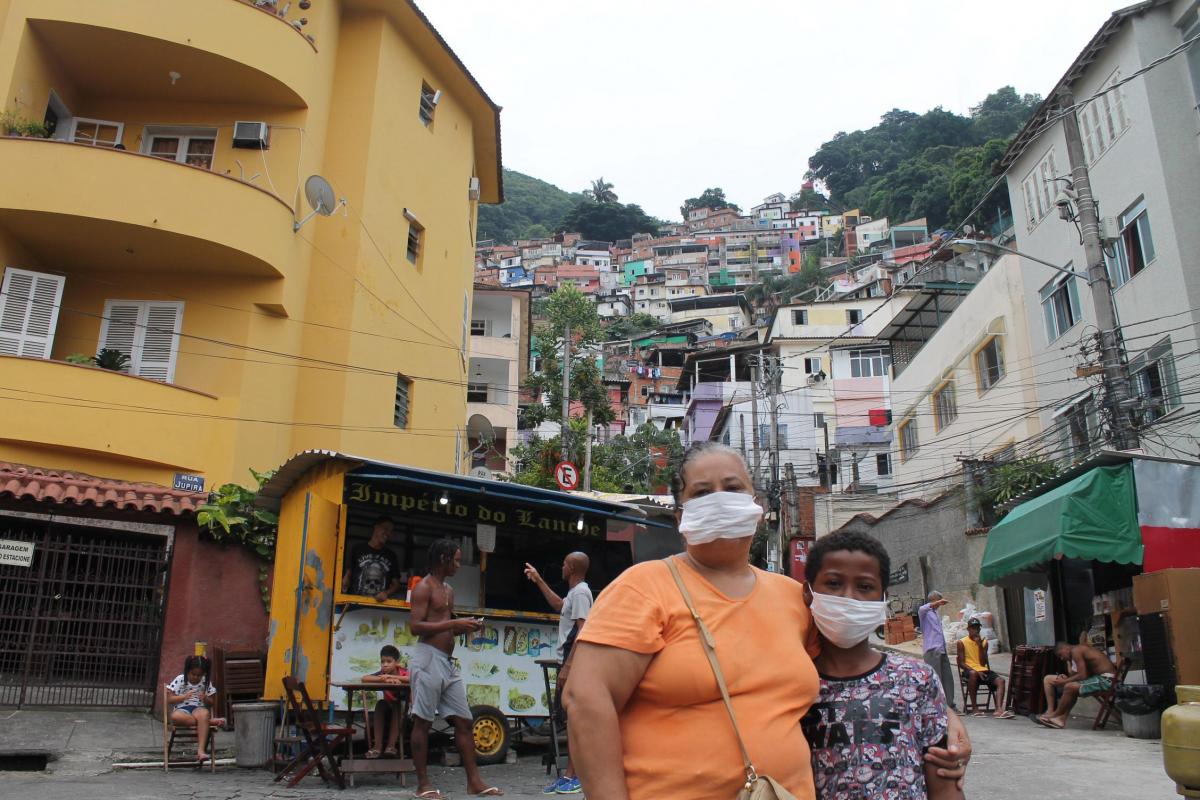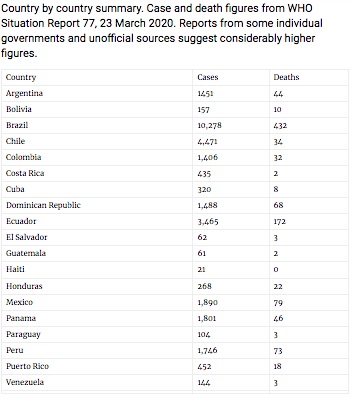Brazil - Slums take their own action in the face of government inaction
One major concern about Covid-19 hitting the region was its impact on indigenous populations, whose immune systems struggle to tackle common ailments and whose populations have been decimated in the past by the arrival of outsiders.
However, this week Brazil confirmed the first case of coronavirus in the Amazon, near the Colombian border – a twenty-year-old woman from the Kokama tribe. She is a medical worker who caught the virus from a doctor she was working with. She has not shown symptoms and has been isolated.
 Health officials from SESAI — the federal government’s body in charge of health services for indigenous people visting Lago Grande village in Amazonas state.
Health officials from SESAI — the federal government’s body in charge of health services for indigenous people visting Lago Grande village in Amazonas state.
As President Jair Bolsonaro continues to deny the reality of Covid-19, instead encouraging people to carry on as normal and to pray and fast ‘to free Brazil of evil’, press reports suggest that the Brazilian president has effectively been sidelined by army General Walter Souza Braga Netto, Chief of Staff. This follows several attempts by Bolsonaro to dismiss his Health Minister Luiz Henrique Mandetta, who had openly contradicted him by calling for more social distancing.
According to a poll published on Friday, the Brazilian population overwhelmingly disapproves of Bolsonaro's stance, instead supporting governors and health authorities who have encouraged social distancing.
Last week, it was reported that gangs who control the Ciudade de Dios favela in Rio de Janeiro took control of situation themselves, imposing its own curfews and their own precautions in the face of the slow response of the government. They were reported to be driving around the area explaining the importance of the curfew. At the time, there were 305 reported cases in the state, where a fifth of the population live in favelas.
In one Sao Paulo favela, Paraisópolos, a residents’ association has also taken action given the failure of the central government to take the pandemic seriously. They have contracted a private health service, including ambulances, two doctors and two nurses as well as support staff. The association told Reuters that part of the cost for the service was funded by donations but refused to say how the rest was raised.

Ex-minor league footballer Emerson Barata, who is part of the Association, mentioned that since the favelas are already abandoned by the state, now they will suffer more. The Secretary for Social Development in Sao Paulo has claimed that the government is providing food subsidies and reducing debt to ease the impact of the virus in the favela, while a water and sewage firm has said it is distributing 2,400 tanks of water to poor neighbourhoods.
Writer, and documentary maker Elaine Blum wrote in the Guardian that Bolsonaro’s policy of denial, intended to keep the economy moving to help his re-election at the cost of countless lives, is proving to be counterproductive. He is now facing impeachment requests, calls for his resignation, and last week there were 15 consecutive nights of protesters shouting ‘Bolsonaro Out!’ from their voluntary self-isolation.
The Brazilian Army, until now allied with the President (he had himself been a captain before pursuing a political career and appointed a number of serving and retired military officers to his cabinet), has also contradicted his policy, instead advocating the self-isolation recommendations of the WHO and scientific studies.
Finally, Brazil’s education minister Abraham Weintraub accused China of being behind the pandemic as part of its plan for ‘global domination’ in a tweet which also made fun of Chinese speech. The Chinese embassy condemned the tweet as ‘absurd, despicable and highly racist’. China is Brazil’s largest trading partner.
Mexico
Just as Bolsonaro had claimed that Brazilians would be immune to the virus, Miguel Barbosa, the governor of Puebla, made a similarly false claim this week that the poor are immune to Covid-19. Since around 75% of the then 475 confirmed cases in Mexico were directly or indirectly due to international travel, and so the victims are ‘the rich’, he claimed wealthier people were ‘at risk’. ‘The poor’ on the other hand, ‘we’re immune’ he said.
Chile
President Sebastian Piñera also made a faux pas, posing for photographs in the capital’s Plaza de Italia despite the quarantine that covers greater Santiago. The square, now unofficially renamed Plaza de la Dignidad, had been the centre of months of protest against the Piñera’s neoliberal government since October 2019.
Heraldo Muñoz, leader of the centre-left Party for Democracy (PPD), tweeted that Piñera’s actions were a provocation and irresponsible. Piñera responded claiming that he had got out of his car to greet the police and military that were directing the traffic, before taking the photo and continuing his journey.
The Chilean Government has responded very slowly to the pandemic, and failed to take effective measures to protect the poor. This has led to lengthy queues outside banks and insurance offices, in defiance of the quarantine, while desperate people try to claim their pension or social security. The police, meanwhile, already deeply unpopular since the protests, have earned fresh opprobrium for violently removing protest art. Covid is the only thing keeping people in their houses, rather than in the streets demonstrating.
Meanwhile on their own initiative, Scientists in Chile have created face masks and protective clothing from the country’s main primary resource and export, copper, known for its antibacterial and antiseptic properties. The masks would be washable and reusable to limit waste. There are currently two companies in the country selling the masks.
Colombia
Hundreds have been evicted after losing their jobs due to the pandemic and being unable to pay rent. The Ministry for Housing estimates that 5 million families live in rented accommodation and so has asked for cooperation amongst property owners to find a solution to the economic difficulties. Some of those evicted were able to return, accompanied by police to the place from where they had been evicted. However, for many it was not possible.
Some of those evicted were Venezuelan migrants who had sought refuge in Colombia. Most had found work selling sweets in the streets or in construction, restaurants, or delivering food. Colombia’s stringent measures have meant that now there is no one to sell to in the streets and no restaurants open to serve in. Without the work, the migrants cannot afford rent or food and some have been forced to return to their home country. The Colombian government has not provided any assistance for their return leaving many to take the 2-3 week walk to the border, as lorry drivers suspend their usual practice of picking up hitch hikers for fear of infection.
Venezuela
In Venezuela, already facing ongoing resource shortages and severe economic hardship, and Covid-19 threatens the total collapse of the public health system on which so many depend. As Venezuelan National Science Prize winner Victor Álvarez wrote that the country desperately needs economic assistance from the international community, not the tightening of sanctions and bounties on the heads of the President and members of his political entourage.
Last Tuesday US Secretary of State announced that sanctions would be lifted if the country formed a coalition government. However, opposition leader Juan Guaidó and current president Nicolás Maduro were to step aside, with leaders of the present government remaining under threat of prosecution. The move is supported by the Lima Group (underwritten by Bolivia, Brazil, Canada, Chile, Colombia, Costa Rica, Guatemala, Honduras, Panama, Paraguay and Peru). Victor Álvarez, however, regards the US offer as counter-productive, disingenuously aimed to prevent rather than promote the formation of a coalition.
Cuba
Cuba was dealt a recent blow when a donation of masks, testing kits and ventilators from the founder of Chinese wholesale online market Alibaba, Jack Ma, was blocked by the US government as part of its ever tightening sanctions. The small island that has sent its doctors around the world (to Italy as well as Venezuela, Nicaragua, Jamaica, Suriname and Grenada) to aid with the effort against the virus, faces severe shortages of basic medical equipment, having asked its citizens to make their own masks.
According to Xinhua, China’s official news agency, the US haulier that was commissioned to deliver the much-needed goods pulled out due to the sanctions enacted last May by the Trump administration which give US nationals and companies the right to sue foreign citizens and enterprises investing in properties nationalised by the Cuban government.

Cuba’s private sector has made efforts to cooperate with the government and aid the fight against Covid, providing free meals for the elderly. Likewise, artisanal soap makers have donated their goods to low-income households and the fashion brand, Dador, has made use of its sewing machines to produce masks.
Haiti
The country faces shortages of essential supplies and vital protective equipment for medical workers, who have staged walkouts in protest of the poor sanitary conditions or who refuse to work due to the risk to their lives. One doctor, the head of Bernard Mevs Hospital, Dr Jerry Bitar, was kidnapped on 27March on his way to work, helping to prepare the hospital for the virus.
Alongside the lack of facilities and supplies in hospitals, the government has also failed to formulate coherent policies. While factories have been shut, workers have not been guaranteed their pay. Likewise, identity cards continue to be issued, causing long queues in government offices despite advice to avoid crowds.
Peru
Peru was the first country to introduce measures, among the most drastic in the world and has in many ways been an example to the rest of the regionin the sense that they seem to be working. The total number of confirmed cases are still less than 3,000, with 107 deaths as of yesterday. However during the process, 60,000 have been arrested for being out and about and charged with 'atentado a la salud publica' which means they now have criminal records. The worry is that President Vizcara is using the epidemic as an excuse to claim dictatorial powers and impose measures by decree which may become self-perpetuating. Remember, Vizcarra has never been elected, but assumed power last year following the resignation of former President Kuscynski in the fall out of the Odebrecht corruption scandal. Vizcarra closed Congress soon after taking over from Kuscynski. A new Congress has been elected but Vizcara declared state of emergency a week before it took its place.
Nevertheless, Vizcarra announced that they will be able to make ventilators, necessary for serious cases, at low cost and quickly. He has pledged that 10 would be made within a week and 100 within a month, compared to the usual 3-month manufacturing cycle. Each machine would cost $5,000. Peru’s weak public health system currently has 276 intensive care units with ventilators. New production aims to bring this up to 500 in the short-term.
Nicaragua
The football league has continued, one of just four in the world to do so during the pandemic, in line with President Daniel Ortega’s denial of the virus. The only club to oppose the continuation of the league was the one that is not financed by the government. It has been reported that many players are scared to continue playing, and do so in the discomfort of facemasks in a vain attempt to protect themselves. However, given the crackdown after the 2018 anti-government protests that led to reports of jailing and torturing political prisoners, of which there are believed to be 73 currently, the players have little inclination to speak against the state that pays their wages.
Ecuador
In the Guayas province, Ecuador, authorities have struggled to collect the dead, whether their death was due to covid-19 or not. Hospitals and mortuaries have been overwhelmed in Guayaquil, Ecuador’s biggest city, which has been hard hit by the virus. Families had to keep bodies of their loved ones in homes for days in some cases or leave them outside on the street. Cemeteries in Guayaquil, the main city in the province, have seen long queues of people seeking burials for their relatives.
An emotional Mayor Cintia Viteri announces that she herself has tested positive for coronavirus. Authorities have since started to distribute 2000 cardboard coffins and have established a WhatsApp hotline for locals to request that authorities remove a corpse in an attempt to deal with the problem.

This overview was produced and first published by The Latin american Bureau by Emily Gregg, a LAB correspondent and author, now based in Arica, Chile. She wrote The Student Revolution chapter in LAB’s book Voices of Latin America (2019).for more great articles on Latin American current affairs visit www.lab.org.uk
Additional material from David Wright in Peru & Peru/Haiti Support Groups UK and LAB correspondents















